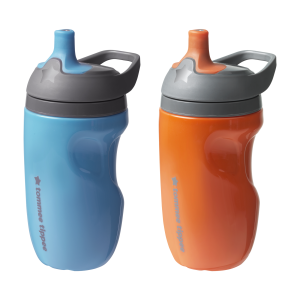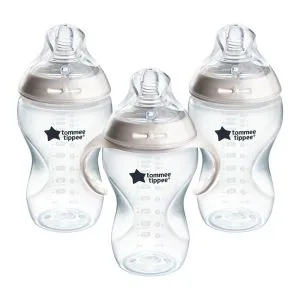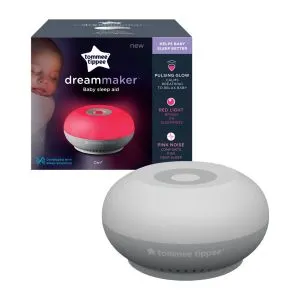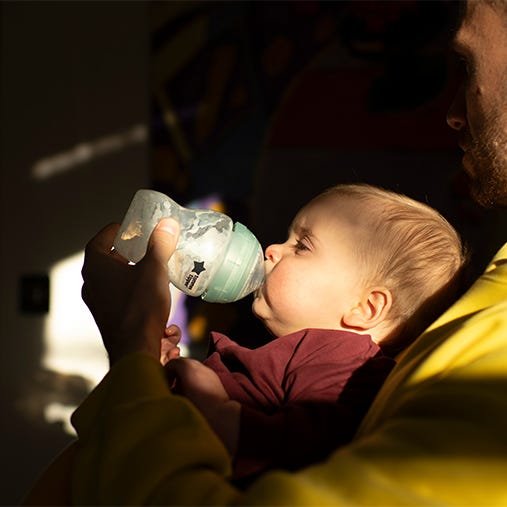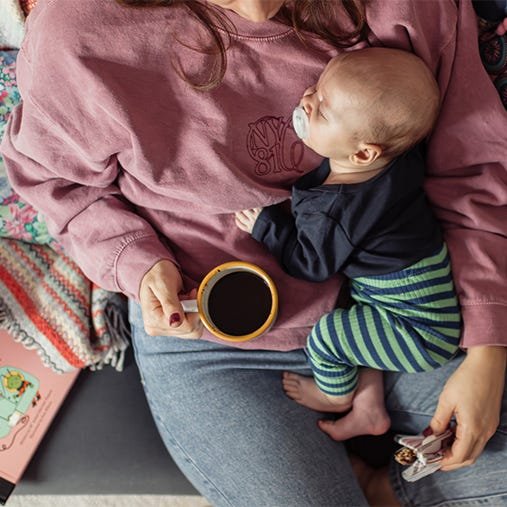This guide has been written with the help of award-winning and practicing midwife Louise Broadbridge to help explain when colic typically starts, peaks, and ends, and to provide reassurance with a rough timeline and some top tips to help you through.
It’s no fun for anyone if your baby has colic. Constant crying can be frustrating and distressing, leaving you unable to relax and wondering what you can do to calm your baby. Colic is a common problem that affects about 20% of infants under 12 months of age and occurs equally whether a baby is breastfed or bottle-fed.
The most common signs and symptoms of colic include:
- intense and prolonged crying
- baby becoming red and flushed in the face when they cry
- baby clenching their fists or arching their back while crying
When do colic symptoms start?
Colic can start when a baby is just a few weeks old, typically around two to five weeks of age. But it's important to note that not all babies experience colic and it's normal for babies to cry and fuss for various reasons in the first three months of life.
Sometimes other things are mistaken for colic, such as the developmental PURPLE crying period short for...
- Peak of crying
- Uexpected
- Resists soothing
- Pain-like face
- Long-lasting
- Evening
When does colic reach its peak?
A baby's colic symptoms are typically at their worst when they're around six to eight weeks old and can last for up to three or four months. Although they can peak at different times of day for different babies, colic symptoms are mostly experienced in the late afternoon and evening.
When does colic end for newborns?
Many parents wonder when colic will end, and the answer is that it can vary from baby to baby. Some babies may experience colic for just a few weeks, while others may continue to have symptoms for several months. However, in most cases, colic will resolve on its own by the time the time a baby is five or six months old.
Louise's tips and tricks for caring for a baby with colic
"The first and most important thing to remember is that you are still a lovely, amazing parent. You haven’t done anything wrong, and it is not your fault that your baby has colic.
Just like the common cold, you are expected to live through colic, but there are several things you can try at home to improve your baby’s colic symptoms. The key is to find what works for you. Parenting isn’t easy. Look after yourself as well as your baby and, with calm perseverance, colic will get better with time.”
Figure out what the problem is
“Babies should be fed regularly, and I encourage parents to create a calm environment where they can concentrate on feeding and bonding with their baby. If your baby is fully fed and the crying stops, the problem was hunger rather than colic."
Check for gas
“To wind your baby, place them over your shoulder with their bottom supported by your arm on that side. With your other hand, pat or rub their back. As your baby is stretched out and upright, this is often the easiest position to get them to burp.”
Treat playtime as a time to relax
"Babies like movement, so carrying your baby around in a sling or taking them for long walks in the pram can be comforting."
Be careful not to over-stimulate
"Babies can become unsettled by over-stimulation. Lots of people or noises can overload your baby’s senses, which can be stressful. Create a calm environment, especially if you think your baby is distressed by colic."
Try out anti-colic bottles
"There are lots of bottles designed to reduce colic. Many of these have venting systems that minimize babies' air intake, such as Tommee Tippee's Advanced Anti-Colic bottles".
Examine your diet when breastfeeding
"Following a balanced diet is key when breastfeeding. You can eat anything you want but if you think something you are eating is upsetting your baby try excluding that food from your diet to see if this helps.”
Have a go at baby massage
"Colic causes severe pain in the abdomen. Gently massaging your baby’s stomach can help relieve the pressure. But seek guidance from a professional baby masseuse before you try this at home."
Speak to your pediatrician
"The good news is that colic does improve over time. However, if symptoms persist, nothing seems to be working and you're struggling to cope, don’t hesitate to ask your pediatrician for support. You won’t be the only one."
Treat yourself with kindness
"It's easy to doubt your abilities as a parent when your baby is crying. If your baby is fed, warm, and loved, you're doing a great job. Keep reminding yourself of this, and your baby will grow out of colic before you know it!"
